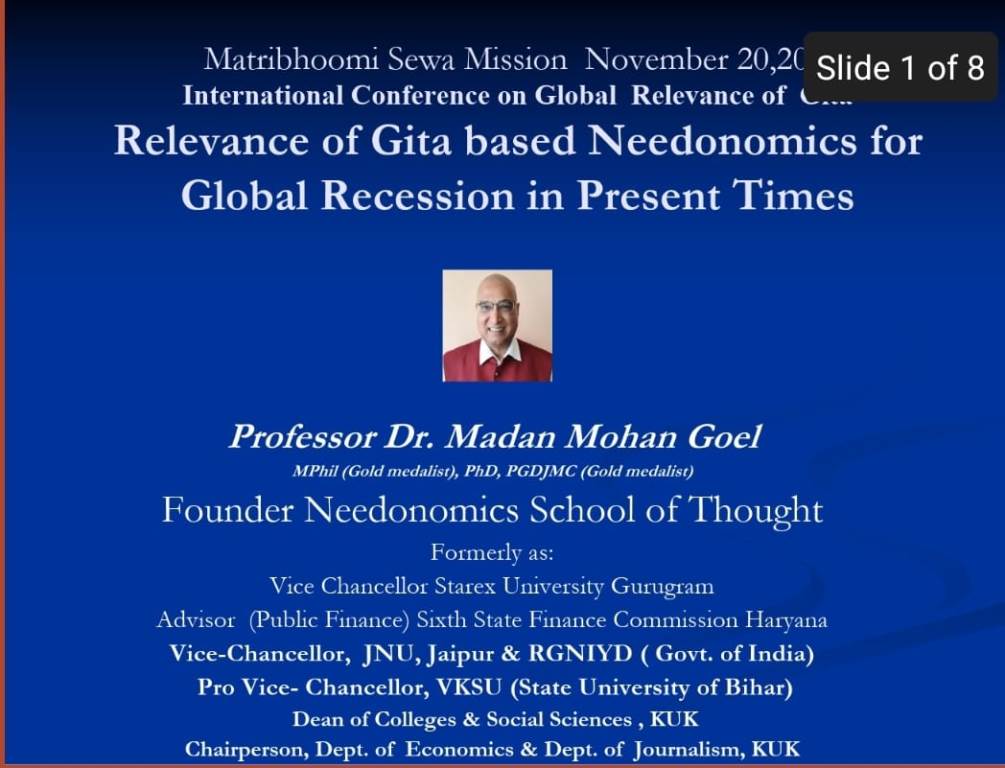It has to be noted that the MSP for wheat from Rs 65 a quintal to Rs 1975 a quintal, has increased many folds in the past 54 years. Still, the MSP regime has not evolved as all-inclusive
 Dr. M. M. Goel
Dr. M. M. Goel

Although MSP is a known word among the agitating formers, yet it deserves to be understood as minimum needs, support needs and protection needs of all the stakeholders including farmers more than minimum support price (MSP) of the 23 agro-products announced by the government. There is a need of adding gur (jaggery), potato and onion to the list and ensure empowerment of the farmers.
The MSP is basically a guarantee to the farmers that if they don’t get a better price in the markets for the covered crops, the government would buy their agricultural produce at a fixed rate — the MSP. This came to be perceived as protection against loss for the farmers.
The agricultural price policy (APP) aims at ensuring remunerative prices to the growers for their produce with a view to encouraging higher investment and production. Towards this end, Minimum Support Price (MSP) Policy – since 4th five-year plan for major agricultural products are announced each year which are fixed after taking into account, the recommendations of the Commission for Agricultural Costs and Prices (CACP-1985) earlier called Agriculture Price Commission (APC) since 1967 when the then Agriculture Minister Jagjivan Ram announced MSP of wheat Rs 65 per quintal. The CACP while recommending prices for 23 agro-products consisting of Kharif crops, rabi crops and other crops, takes into account all important factors, viz. cost of production, changes in input prices, input/output price parity, trends in market prices, inter-crop price parity, demand and supply situation, the effect on industrial cost structure, the effect on the general price level, effect on cost of living, international market price situation, parity between prices paid and prices received by farmers.
To create and maintain buffer stock (the stock by the Government for food security) by Food Corporation of India (FCI), we need procurement policy. The CACP used to announce the procurement price for food grains within the storage capacity to hold these stocks. It used to provide a higher price above MSP to farmers for selling to FCI. Sadly, we stopped to do so now reasons best known to the commission itself. It is to be noted carefully that if we want to adopt a farmer-friendly approach, there is a need for creating storage capacity with the farmers even by hiring godowns. If it is done, there is no need of procurement prices to be announced.
There is the concept of ‘Issue Price’ as the price on which the consumers (BPL and APL) get the products (food grains) through Public Distribution System ( PDS), RPDS and TPDS.
To ensure sufficient production of food grains by the farmers, they are required to be motivated to continue producing which calls for the MSP policy. It is a pro producer/ farmer policy.
Three of the objectives of MSP policy including to raise productivity through assured remunerative prices to the farmers, to procure sufficient food grains for the PDS, RPDS and TPDS and to promote a desirable intercrop balance.
There are weaknesses in the MSP policy including there is time-space required in the announcement of MSP in advance, data on the costs of cultivation is old to be used for determining MSP, variations on the MSP caused by State Governments, limited scope confined to food grains and no benefit to small and marginal farmers.
It has to be noted that the MSP for wheat from Rs 65 a quintal to Rs 1975 a quintal, has increased many folds in the past 54 years. Still, the MSP regime has not evolved as all-inclusive.
The NSSO survey of July 2012-June 2013 showed that less than six per cent of Indian farmers (over 9 crore agricultural households) have benefitted directly from selling their wheat or rice under the MSP regime. This means an overwhelming majority of farmers could never become part of the income guarantee scheme for the farmers in so many decades.
This means that there is something inherently wrong with the MSP regime as well as the legal-administrative framework that governs agriculture in India. It was this assessment of the present government which had set up the Shanta Kumar committee to study food procurement mechanism and suggest ways for reforms, that the government brought two new farms laws and amended one existing law recently.
The MSP has remained in focus for several decades. In 2014 Lok Sabha election, the BJP too promised to double the farmers’ income in five years or so.
A report of the MS Swaminathan Commission is often referred to for a good price for the agricultural produce grown by the farmers. The last report of the commission was submitted in 2006. The present government implemented the recommendations but only in parts expressing the inability of full implementation by any government under the given circumstances.
It needs to be noted that the Food Corporation of India (FCI) proved to be the villain and deserve to be winded up for the desired agricultural reforms. The ownership of the FCI storage should be transferred to the farmers for selling their agro products in a phased manner which calls for separate MSP for every month and can do wonders in doubling their income. We have to make storage easy task with facilitative setup within reach. We should prepare ourselves against vagaries of weather including droughts and floods by adopting rain harvesting.
To escape the debt trap for farmers of huge dimension, we have to understand ‘Cobra effect’ making solutions worsening the problem (unhappy consequences).
We need to adopt a rainbow revolution in Indian agriculture which means higher productivity plus agro-product processing and their exports for doubling the income of the farmers. Being needonomist, I believe that if jaggery (gur) is promoted as appetiser and dessert for the foreigners around the world, it can fetch a fortune for the economy. But it requires a brand name which is possible by declaring Khadi Village Industries Commission (KVIC) as MNC. We have to create demand of jaggery by justifying its need for reducing many ailments including obesity, make it affordable and price worth of it as a NAW( need, affordability and worth) approach of marketing.
In present times when the farmers are picketing at the borders of the national capital, a guarantee of an assured income remains their best hope. However, it is uncertain how such a guarantee can solve the problems of the farmers, particularly the small and marginal ones, if the same framework has failed to deliver in over 50 years despite the proverbial green revolution in India. There is a strong case for serious research on improved information on wages, poverty and investment incentives available to the farmers in India. There is a need for policy implication oriented research and not only t-value significance at the 95 per cent level of significance with many disconnections. To improve the quality of life and living, we have to be street smart (simple, moral, action-oriented, responsive and transparent) with a commitment for the national development including farmers who deserve empathy (not sympathy).

* Former Vice Chancellor and Needonomist Professor presently Advisor (Public Finance) 6th State Finance Commission Haryana www.needonomics.com






Good